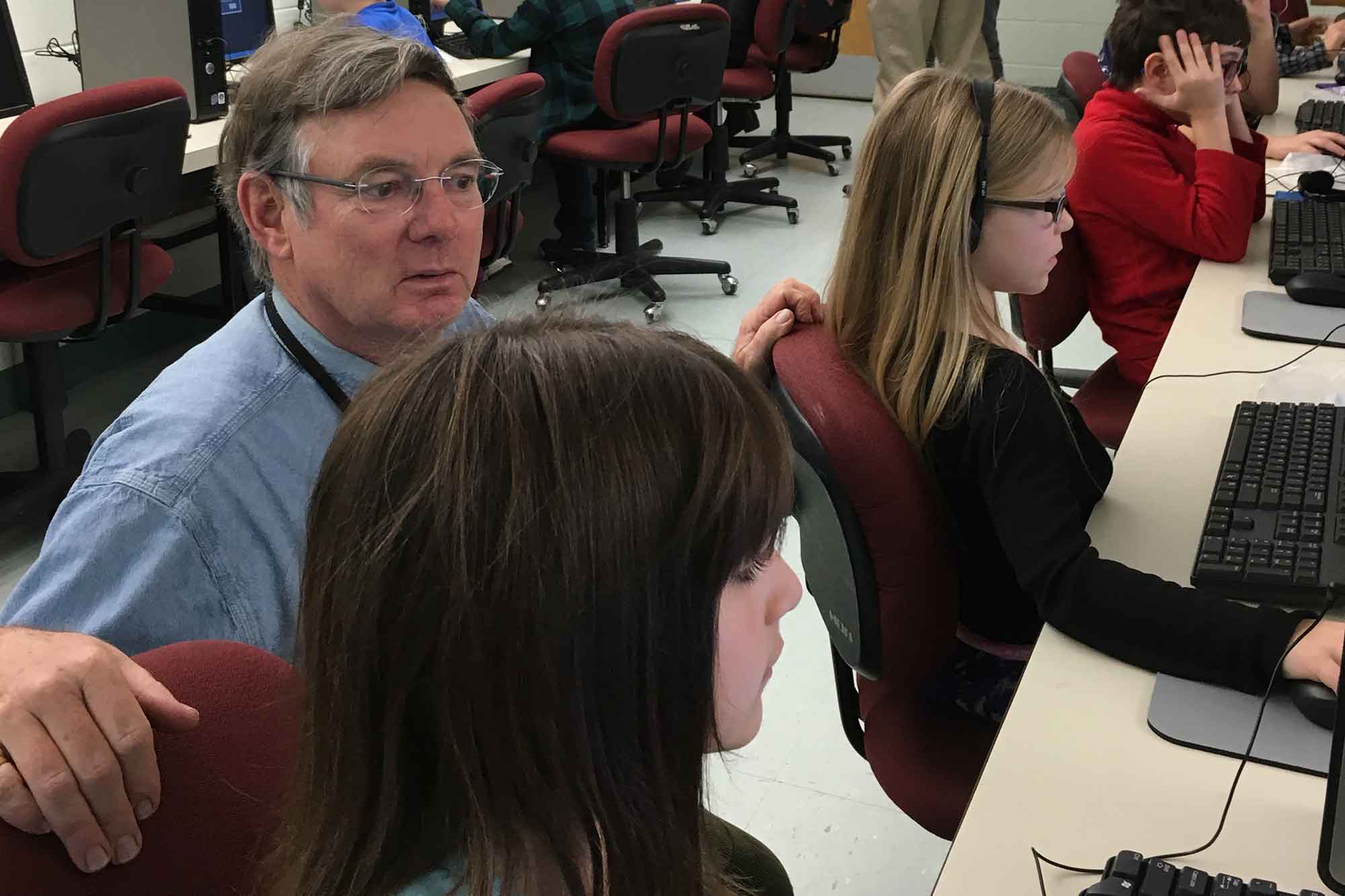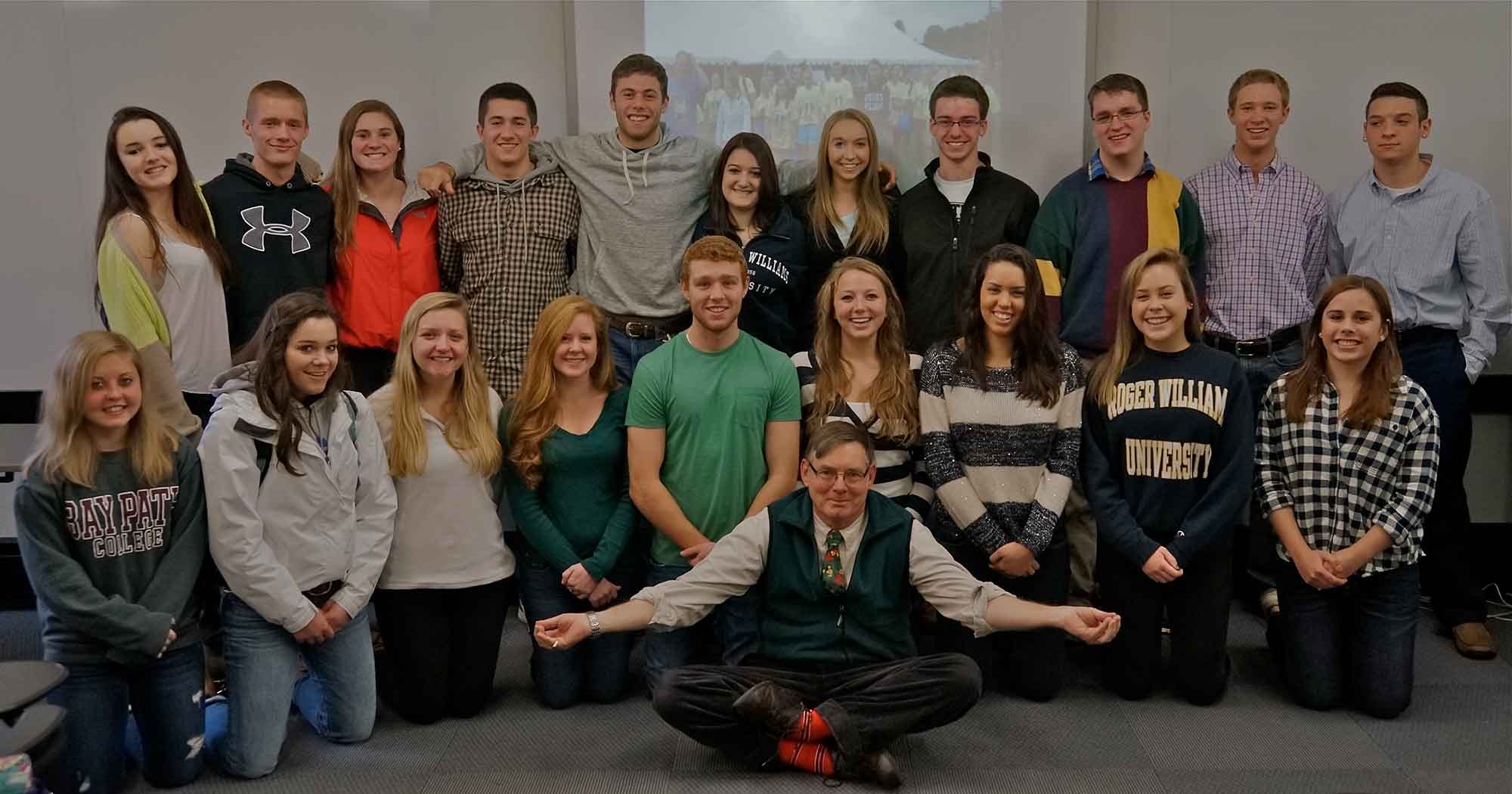About You & Your Connection to Roger Williams University:

1. How did you first become connected to Roger Williams University?
I moved to Rhode Island in 1982 and first heard of RWU through its extension program on the Navy base. In my early civilian work-life, colleagues raved about the spring concerts — I think 10000 Maniacs was the big hit. My first visits to the campus were through university public programming, lectures and the Barn theater. RWU public programming was really terrific — great speakers, Erin Brockovich, Chris Hitchens, Bryan Stephenson and Cole Brauer.
2. What has being involved with RWU meant to you personally and professionally?
Wow! That is a challenge. I would not be who I am today without my 20 plus years at RWU. Also, one of the joys of being faculty and the teaching profession is that the personal and professional become intwined. Private events, such as dinner with an attorney from DeBevoise and Plimpton who wrote the SEC equivalent regulations for Russia in the 1990s, introduced me to a contact for a presentation to my class and informed my perspective on finance, regulation, and international cooperation.
Personally, while at Roger Williams, I continued to learn and advocate for diversity, especially the inclusion of women in traditionally male dominated fields. The origins for this commitment lay in having been a a midshipman at the Naval Academy during the integration of women into the Brigade of Midshipmen.
Professionally, I extended my advocacy for diversity while at Roger Williams. I restructured my classes to make them more open to different approaches to learning which benefited all students. I led the RI section of the National Center for Women in Technology that advocated and supported the pipelines for women to enter technical fields. I was also able to encourage and with the university support take fabulous female students to technology focused conferences. I had the chance to take male students, but that was more common across the country and in my field.
3. How has your education from RWU / working at RWU shaped your career, or your philanthropy or volunteering?
Support for students, in particular for academic research with faculty was a significant part of my RWU experience. It had not been available to me in my undergraduate program. It made a differ in the lives and career paths of all my students I worked with.
4. Do you have a favorite memory, moment, or accomplishment from your time at RWU?
I had many great moments at Roger Williams — particularly the engagement with students — from the serious, in the classroom and academic research to the frivolous — getting pied for the Multicultural Student Alliance Fundraiser — performing for “So you think your professor can dance!”
A unique and lasting memory came from grant funding to support young women (really girls in 5-7th grades) from GirlsInc in Taunton, MA. I created a day camp where students from the Lady Hawks and female students from my computing classes led a combined workshop for visiting girls. We began the day with basketball drills then went to the computer labs and created computer programs in animation software to replicate some of the basketball drills. Not only did my computing students have to participate in basketball — a new experience for my student from Vietnam — but the basketball players had to help coach the girls with their programming. The workshop was so multilayered with sports, academics, cross age and cross cultural understanding that everyone really benefited from the interactions. It was a little bit like a gifted and talented program for the extremely underprivileged.
5. What have you been involved in at RWU, including work, volunteering, education (research, study abroad, clubs/organizations, athletics)?
RWU outreach is a real hallmark of Roger Williams University — my doctorate was at Clark University, Worcester where I was first introduced to the roles a university could play in the community and I was enthused when RWU under President Farish inaugurated the Community Connections program. This really came into play after I had developed a minor in Arts Administration and Arts Management. The infrastructure of the Community Connections allowed much greater access to real world experiences for my students.
A most memorable one was a project for the Westport Cultural Alliance that was advocating for inclusion in the revision to the Community Comprehensive Master Plan. The Alliance did not have the staff to collect data and analyze the role of the arts in the community. Under the banner that the arts could unite the disparate parts of Westport — from the estates boarding the ocean, to the farms in the center, and the factory district bordering Fall River — my students analyzed and presented their findings to the CCMP and Town Council.
Community involvement also allowed me to bring Newport Contemporary Ballet to my classes, not just to give the students a deeper understanding of dance but also to lead them in a workshop based on trust and cooperation. These workshops were also implemented with the Sailing Team, where I was the faculty representative from the early 2000 to my retirement.

Your Inspiration for Giving:
1. What inspired you to include Roger Williams University in your estate plans?
My extended family has a tradition of giving and my understanding of the history and structure of American higher education and the unique place of American philanthropy in society gave em a sense of obligation. I had not originally considered RWU for a legacy gift but was prompted by the action of a respected colleague.
2. Is there a particular aspect of our university – our mission, students, or programs – that is especially meaningful to you?
There are two aspects of RWU that are particularly meaningful, one sadly seems to be declining in importance as it is in many institutions of higher education. The humanities are critical to a true university and need the same support as more lucrative pre-professional fields like business and engineering. I had formerly been at Bryant before they expanded their humanities offering and became a university. When I arrived at RWU it was a real joy to be at a university that had such rich offerings in arts, science, social science, engineering, and architecture at such an intimate institution. The joy of having business, arts, engineering, architecture, and science students in my classes — sometimes not many from each field, but one or two - made for a much richer experience for all of us. It is with sadness that since my retirement foreign languages, theater, dance, and other humanities seem to hold a less important place.
The other area is the significant support Roger Williams provides for the success of all students. The accommodations for learning differences, the testing center, the writing and math support arenas demonstrate a real commitment to student success. These support structures really enabled students to succeed who may not have in a more cutthroat academic setting.
3. How do you hope your gift will make a difference for future generations of students? Your Legacy & Personal Reflections:
- When you think about your legacy at RWU, what would you like people to remember most?
RWU, like our namesake, was respectful and welcoming to all peoples. Were I to be remembered, it would be for the engagement and support of any an all students regardless of background, economic status, or interests, - Is there someone or something that inspired your philanthropic values – perhaps a mentor, family member, or life experience?
I cannot say it was somebody in particular inspired my philanthropic values — it was just in the air. Were I to stretch, I might say my mother-in-law who had been special assistant to the president at Vassar College who was clear about a legacy gift. I would also say it was my service on the board at the RI Historical Society, Goff Institute where I saw the significant impact of a small grant. For example, just paying for a school bus to transport middle school students to Rose Light, allowed the students and teachers to make a more meaningful lesson. Just as a research stipend for a graduate student allowed them to make use of our archives in ways we could not imagine. - What advice would you offer to others who are considering making a planned gift to RWU?
Do it — and trust that the university will use your gift wisely. Think of it as inviting someone to dinner — you cannot control the conversation but you will learn and benefit from their presence.
Personal Touch:
Would you like to share anything about your life outside of the university – hobbies, interests, or something people might be surprised to learn about you?
I was originally from New Zealand — the scope and social dimensions of philanthropy is culturally very different (it has changed over my lifetime). In my adulthood, I have grown into its role in American society. I have had an incredibly rich life — I served in the US Navy, I worked in academia both as support staff and faculty — I had the good fortune to marry an artist. At this point, I am casting about for my encore career. Not sure where that will take me but I am optimistic the adventure will continue.
